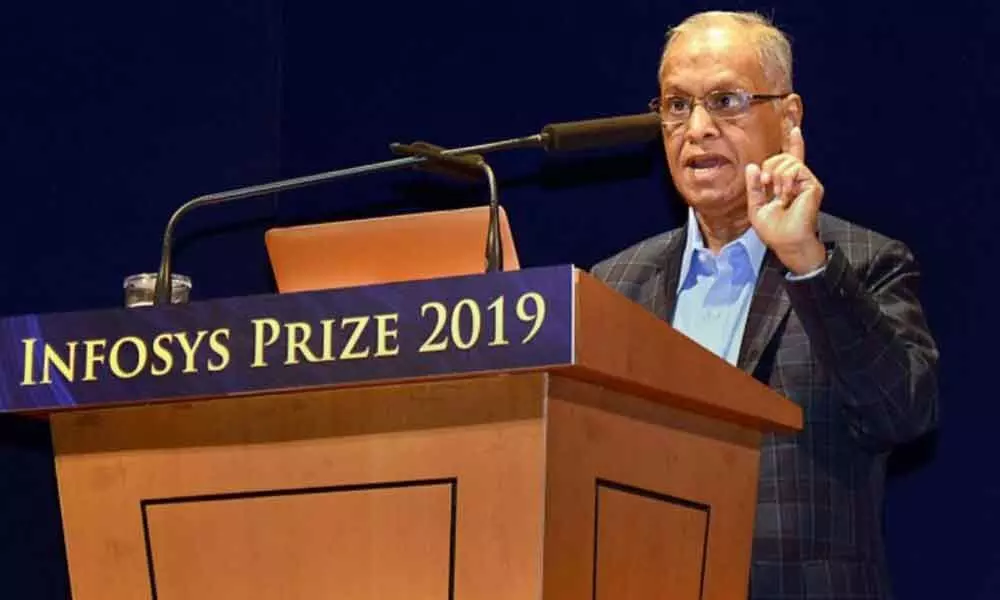Live
- US accounts for 18 per cent of Indian exports in FY24
- Will end Naxalism in Chhattisgarh by March 2026: Amit Shah
- Will gift one project daily to people during Jan Kalyan Parv
- Mahakumbh & the Politics of Sanatan Nationalism
- A Soulful Celebration of Global Music
- Brahmin Community delegation felicitates CM Saini
- Allu Arjun Visits Chiranjeevi’s House for Lunch Meet
- Toyota organising TG Grameena Mahotsav
- Special rituals conducted at Maramma Temple
- Siddaramaiah has special love for Muslims: BJP
Just In
Pursue fundamental research, Narayana Murthy tells youngsters


IT czar N R Narayana Murthy on Thursday said he wants India to be a place where discovery and invention happen every month.
Bengaluru (PTI): IT czar N R Narayana Murthy on Thursday said he wants India to be a place where discovery and invention happen every month.
Noting that India probably has more problems facing its citizens than any other country in the world, he stressed on the need for country's youngsters to pursue fundamental research.
"What kind of research should our youngsters do? I want it to be 'an expression of age as well as an influence operating upon both present and future,' as Abraham Flexner once said. I want India to be a place where discovery and invention happen every month," Murthy said.
Addressing an event organized to announce the winners of the 11th Infosys Prize by Infosys Science Foundation, of which he is a trustee, Murthy said, our youth deserve to invent some important stuff valuable to India and the world so that they are recognised and respected. "Else, what is our contribution to this world as a nation of 1.25 billion people?" he asked.
Pointing at India's own history of advances in Science and Mathematics, the Infosys co-founder said, there were many Indian scientists and mathematicians who did "earth-shaking" work during the "golden period" of science and mathematics in India from 100 AD to 1400 AD.
"The scientists and mathematicians of the golden era of Indian science and mathematics were some of the deepest and most original thinkers of the world of that period," he said, as he listed the contributions of Aryabhatta, Brahmagupta, Bhaskaracharya, and Madhava.
"The conclusion is that our youth is capable of original thinking if we create an environment that encourages such adventures of mind," he added.
Observing that there were even more important reasons why our youngsters have to be encouraged and equipped to become contributors to solving huge problems that confront us every day, Murthy said, India probably has more problems facing its citizens than any other country in the world.
"Our huge population is a big bottleneck for providing our children with basic education, healthcare, nutrition and shelter," he said.
Murthy believed that we could find appropriate solutions to our problems if we educate the youth to think independently to use research and its applications.
He stressed the need to provide full freedom of inquiry and imagination to youngsters who enter the portals of the country's higher educational and research institutions.
"These youngsters come in as intelligent, curious, enthusiastic and energetic young men and young women, and they have to be nurtured to leave as confident, knowledgeable, daring, open-minded and independent thinkers that will go after solutions to the problems of our country," he opined.
Raising several queries like- can our youngsters find a vaccine to chikungunya or dengue? can they find an inexpensive solution to desalination of sea water? among others, Murthy said, if our youngsters can find solutions to these problems then they would bring back pride to our people ,and to our future generations.
Murthy further said, we have to overcome our "skepticism" about the so-called "useless knowledge" and start helping our youngsters pursue fundamental research enthusiastically.
Also speaking at the event, another Infosys co-founder Kris Gopalakrishnan underscored the need for increasing the overall per cent of spending on research. "Today India spends 0.6 per cent to 0.7 per cent ofGDP on research. Out of this 0.6 per cent is spent by the government, private sector that includes philanthropy spends 0.1 per cent on research. Developed countries like- US spends3 per cent, Korea 4 per cent and China 4- per cent.
We have to increase the overall per cent of spending on research," he said.
Government has made a commitment to increase their spending to 1 per cent, but the private sector and philanthropy have to significantly increase above what they are doing today, he said adding "the wealth is there, we need to spend that money."

© 2024 Hyderabad Media House Limited/The Hans India. All rights reserved. Powered by hocalwire.com






